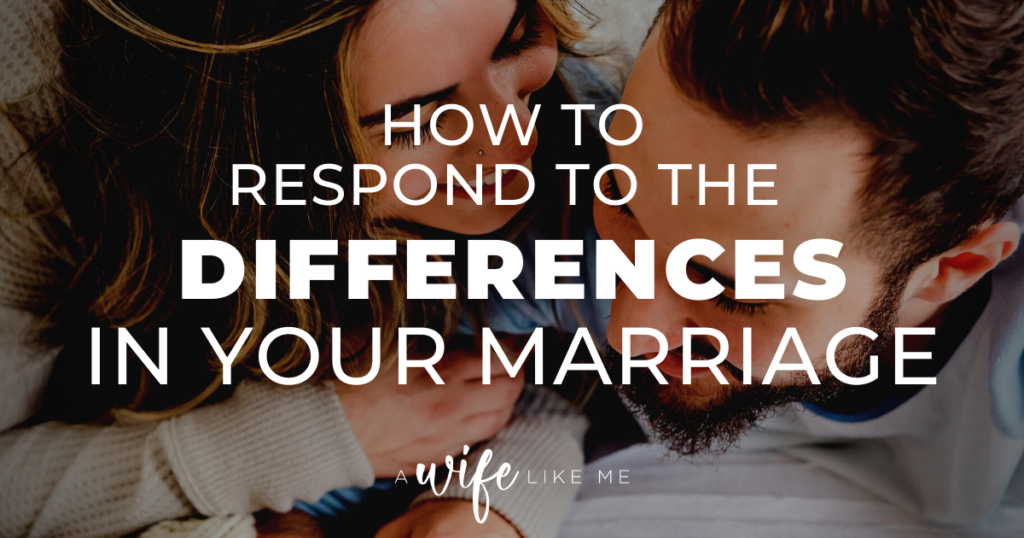Grab our free marriage resources here!
By Theresa Boedeker
How do you handle or respond to the differences in your marriage? We often think marriage should be easy. But two people equal multiple differences.
Marriage involves two people. Two different people. With different backgrounds, upbringings, rules for life, and even senses of humor.
This is why the two people within the marriage can disagree about everything from replacing the toothpaste cap to how to mow the lawn. And why a shocked “I can’t believe you did that,” or “believe that” can burst from a mate’s mouth when one sees the other do something that has never entered their mind. (Or might have been off limits in their childhood home).
Two Different People Equal Multiple Differences
Sometimes I wish our marriage had come with a manual outlining our key differences and our future points of conflict. A snazzy two-page, large-easy to read chart showing how radically different we are.
Like how he focuses on the minute details, and I focus on the big picture. How he rises early, and I stay up late. He asks direct questions, while I skirt politely around the issue. Or how he plays a game to win, and I play to have fun and interact with others. (Isn’t the game just the thing to do?)
Surely you and your husband have just as long of a list of differences as mine, because two different people equal multiple differences, every time.

Communication Is a Biggie in Marriage
My nature is to tell a long story. Who doesn’t want to hear all the details and let the excitement slowly build?
My husband wants just a bottom-line, one sentence summary. Then he starts asking questions, as if he’s preparing a client for trial. One question at a time. And if I jump ahead, because I anticipate he’ll ask question D next, and so I provide the answer to both C and D, he gets confused and has to start over with C.
I assume you can see how these two different styles of communication have caused a few patience-losing comments in our marriage. Verbose and succinct are not always good dancers.
Did I know this when we were dating? No, he enjoyed my chatting that filled the silences. And I enjoyed his listening ear.
Learning About Your Spouse Helps You Learn About Yourself
Time has taught me, as well as his interrupting and circling hand motions, to wrap my long stories up. Maybe cut them by 80%. That he likes very linear communication. Step 1, then 2, and so on. No skipping ahead or returning to a previous point. Because this confuses his brain.
And he has learned I can skip from point A to D with the best of them and that my brain works in big, loose circles that draw only curvy, organic lines.
Over time I have come to enjoy and appreciate shorter conversations that don’t take an hour and touch on a myriad of other topics. With careful attention, I can now follow a numerical outline type of conversation.
At the same time, he has learned to enjoy a good tale that slowly develops when he is not focused on moving to the next task. That things can be communicated without already pre-knowing where the end point lies. And he has learned by my example how to tell a better story.
Creating a Culture Where Both Can Thrive
This is what marriage is about: Growing. Changing. Adapting. Compromising. And even learning from one another. Merging our two totally different ways of doing things into a pattern that works for us.
On walks, meals at the restaurant, or on porch swings in the backyard, he speaks my love language and lets me ramble to my heart’s content, just listening. Asking an occasional question. Enjoying my voice and the story.
During the day-to-day short interactions, I speak his love language, and try to talk in text clips. Moving from point A to B. And if there is a more elaborate piece of news to tell, I provide him with the one sentence, bottom line summary and work back from there. (Which frankly, I think ruins the story, but he likes it.)
It’s not easy.
It doesn’t come naturally to either of us.
It involves patience. Compromise. And remembering what speaks love to the other person.
But it’s worth it.
When we accept them and their differences, speak their love language, respect their personalities and preferences, and have curiosity as to what makes them thrive, they will feel loved, accepted, seen, and our marriages will thrive.
Wife Step: How can you better speak your spouse’s love language in an area where he is different from you? What would you like him to know about you in that area? How can you compromise or better support your differences in that area so both of your needs get met?
Grab our free marriage resources here!

Theresa Boedeker has been married to her husband, her complete opposite, for over 30 years. They live in the Midwest and have two children, 15 years apart, and a few grandkids. Theresa daily hunts for humor and tries to bring forth laughter from others. She is passionate about helping women smash lies with God’s truth. Overcome shame. Learn to laugh at life and themselves. Notice God’s love and grace. And not be afraid of making mistakes. She unwraps life and faith at TheresaBoedeker.com. When she is not writing, she enjoys doing creative things like cooking, making jewelry, and taking photos of flowers (they never run from the picture).
Be the first to comment